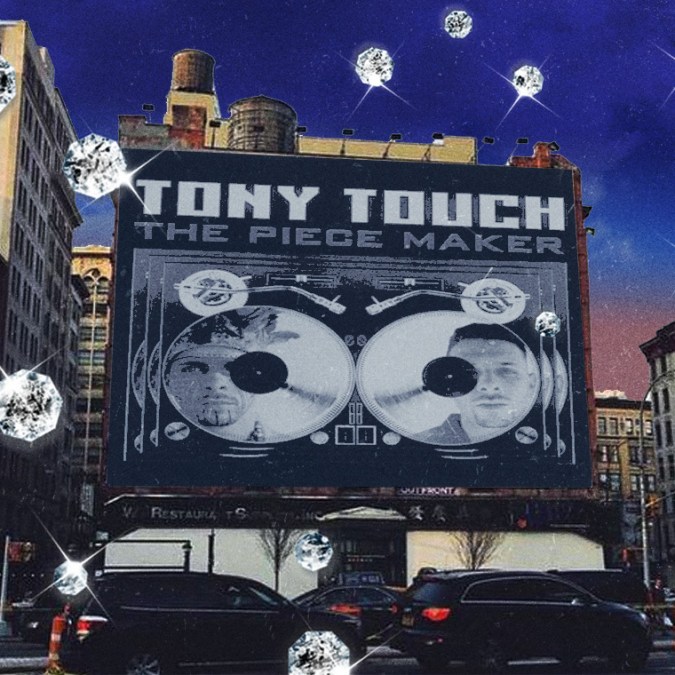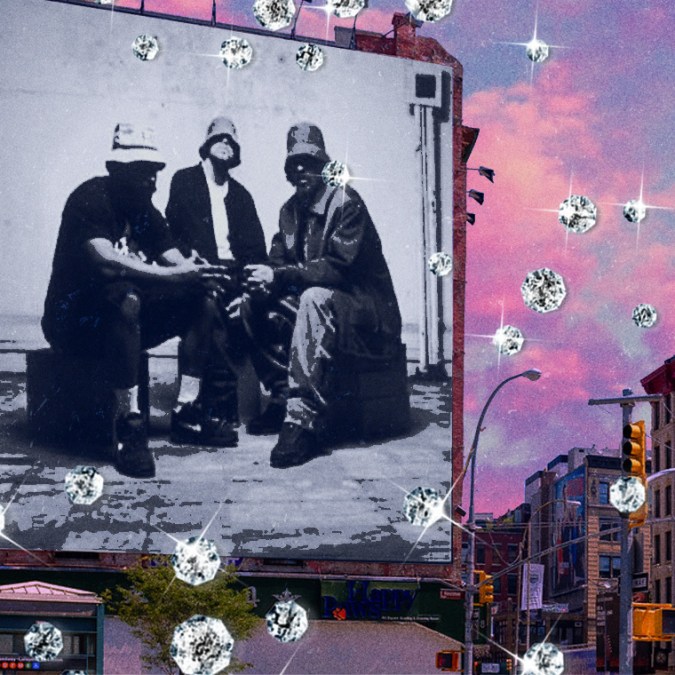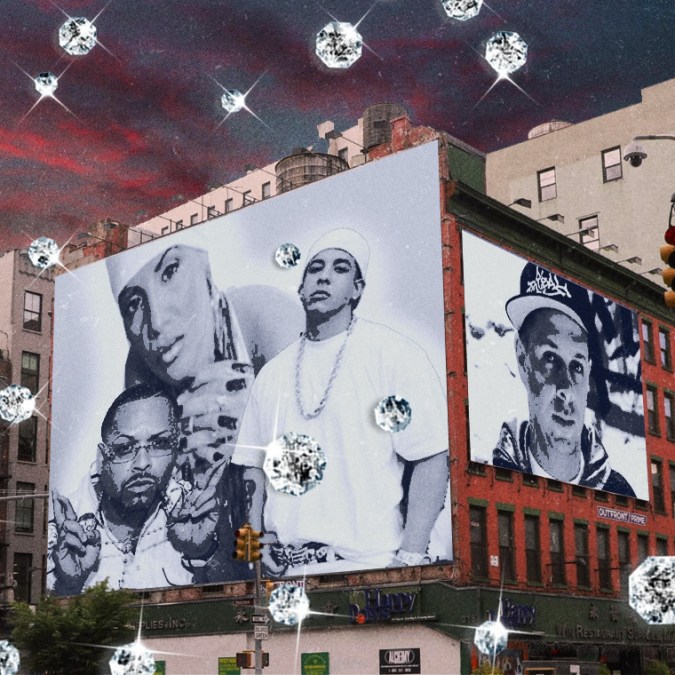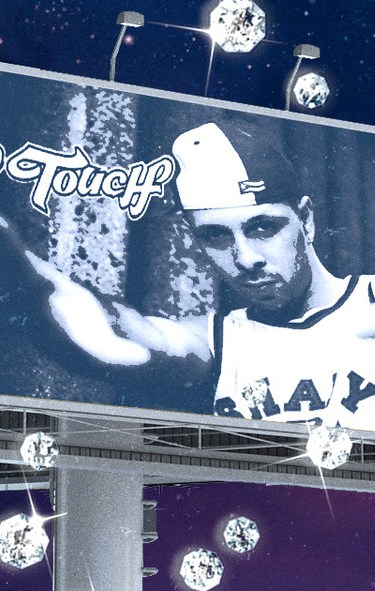Latinxs are more visible in American hip-hop than ever before, but yet still so obscured. Despite being part of this music from the very beginning, from the first Kool Herc party in the Bronx, Latinxs are still treated as second-class citizens in a genre we not only helped birth but have participated in as artists, managers, label team members and listeners. Latinz Goin Platinum is here to highlight our successes, past and present, as we build towards rap’s future, uncovering histories hidden in plain sight and identifying the Latinxs currently active in hip-hop.
“Everybody’s checkin’ for Pun, second to none
‘Cause Latins goin’ platinum was destined to come.”
-Big Pun, “You Came Up” (1998)
Tony Touch makes the best of a bad situation. Ever since COVID-19 concerns sent people to the relative safety of their homes for self-isolation and social distancing, the Brooklyn-bred DJ born Joseph Anthony Hernandez dutifully took to his turntables to entertain the quarantined masses. A consistent presence on Instagram Live and concurrently in Zoom’s virtual conference rooms since mid-March, his luxuriously lengthy sets can last late into the night and regularly reflect his twin heritage of New York City and Puerto Rico. From throwback salsa throwdowns and fabulous freestyle fetes, to tributes to those felled by the virus like Nuyorican dance music pioneer Danny Vargas, Tony Toca has yet to disappoint. All of this, of course, is in addition to his weekly #TocaTuesdays hip-hop show on SiriusXM’s Eminem-helmed Shade 45 radio station.
Hernandez’s pandemic productivity should surprise no one familiar with his history or reputation. Having grown up during hip-hop’s tumultuous formative years, the former b-boy parlayed his 1980s breakdance cred into a legendary run as one of the city’s most prolific mixtape practitioners in the 1990s. Whether spinning the clubby and inclusive sounds of house music or the illest cuts by the rawest rappers in the game, his genre savvy helped make him one of that decade’s biggest figures on the ones and twos.

Of these still quite collectible tapes, his ambitious “50 MCs” series (aka Power Cyphas) ranks highest for featuring dazzling bars from a wide range of artists, from G.O.A.T. contenders like Black Thought and Guru to relatively unsung spitters who were out and about in those days. The retrospectively awe-inspiring endeavor and related tapes notably included a number of Latinx acts on the regular, including Terror Squad heavies Cuban Link and Triple Seis. That standard of representation would carry over to The Piece Maker, one of the most important if often overlooked albums in the history of hip-hop.

While the tapes cemented him in the streets and certified him in the clubs, Hernandez still had ambitions of overseeing an album project. And in 2000, that became a reality with the involvement of Tommy Boy Music. A good fit for his breadth, the record label knew a thing or two about Latinx hip-hop, having previously released seminal records like Noreaga’s Melvin Flynt Da Hustler and TKA’s Scars Of Love. But considering the connections he’d made over the years, Hernandez wouldn’t need to rely on the label’s roster to stack The Piece Maker with an enviable roster of guest emcee talents.
Gang Starr came through. The Wu-Tang Clan did too. Even Eminem, then-ascending rapidly into the ranks of the biggest rappers in the world, paid homage with a characteristically offensive verse, out of respect for one of the crucial influencers that put him on before he was popping. Prodigy of Mobb Deep got his own song, as did Cormega and Royce Da 5’9”. Hernandez secured Jay-Z’s go-to Al Pacino impressionist Pain In Da Ass—famous for his appearances on the Carlito’s Way intros to In My Lifetime, Vol. 1 and Vol. 2—to do some film dialogue recreation on “Return Of The Diaz Brothers.” From end to end, The Piece Maker’s line-up bridged Golden Age greats with underground kings and hotly tipped new jacks, showing off Hernandez’s deep and genuine connections within the culture.

Apart from just how timely and of-its-time The Piece Maker was, a big part of what makes the album meaningful is how Latinx artists were seamlessly integrated into the mix. Decades removed from its Bronx street gang origins, hip-hop had a national profile and big money coming from the business. In 2000, suburban kids with no connections to the culture of New York or Los Angeles or any other noteworthy regional rap scene knew Notorious B.I.G. and 2Pac bars by heart. Furthermore, the luxe Shiny Suit Era propelled by Puff Daddy’s Bad Boy and others in the late ‘90s had inadvertently removed the barriers to entry for these new listeners, with lyrical content about success laden with references to European clothing brands. Room in this wider American conversation for Latinx rappers who wanted to rep la cultura was scarce, with Big Pun and Fat Joe being the exceptions.

With The Piece Maker, Hernandez wasn’t going to waste the opportunity to put his people on, including those who were less known outside of their respective cities. Tha Alkaholiks’ Afro-Rican emcee Tash dropped a standout verse next to his Loud Records labelmate Xzibit on “Likwit Rhyming,” while The Beatnuts’ resident Colombian Psycho Les delivered on “Pit Fight” next to Greg Nice of the seminal ‘90s duo Nice & Smooth. Known for his opening verse and hook on Frankie Cutlass’ 1995 underground hit “Boriquas In The Set,” a posse cut that emphasized Latinidad within the hip-hop scene, rapper Doo Wop spat over the aforementioned “Return Of The Diaz Brothers.”
Some of the biggest Latinx hip-hop artists of the day got their time to shine on the project too. With their Skull & Bones album topping the Billboard 200 around the same month The Piece Maker charted (No. 59 peak), Cypress Hill let the referential ad libs and fresh rhymes flow on “U Know The Rules (Mi Vida Loca).” Having tragically passed away mere weeks before The Piece Maker dropped, Big Pun left us a posthumous hook and some dope bars on “The Foundation,” backed up by Terror Squad familiars Reif-Hustle and Sunkiss.
His hip-hop bonafides very much intact, Hernandez could’ve made The Piece Maker purely a rapper’s delight and left it at that. Still, his love for all types of music and keen curatorial ear for quality made the album even more inclusive. He nods to his clubby ways on the signature “I Wonder Why (He’s The Greatest DJ),” a disco-tinged hip-house jam with Bad Boy’s girl group Total handling vocal duties. But it was the penultimate cut “P.R. All-Stars” that showed how locked in he was to emergent musical movements.

Following in the formidable footsteps of DJ Playero and Nico Canada’s 1997 game-changer Boricua Guerrero: First Contact, the song added some of the rising reggaetoneros to the album’s hip-hop mix. With Spanish-language lyricism in play, the presence of urbano pioneers Daddy Yankee, Don Chezina, Ivy Queen, Mexicano 777 and Ray Pirin on the same project as so many of the finest rappers and producers in the game at the time exhibited a savvy understanding of the burgeoning urbano wave and its genetic connection to hip-hop stateside.
In a few years time, reggaetón would become one of the biggest sounds in New York, a fitting situation considering how much the city’s hip-hop music influenced that genre from the jump. Tony Touch’s prescience and ethos of inclusivity makes The Piece Maker more than a mere time capsule or snapshot of yesterday, but a pivotal recording that precedes and foresaw the bilingual team-ups ripping through the charts in the U.S. and globally today.




